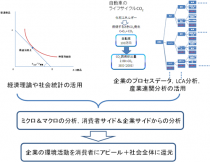The creation of indexes for fostering green manufacturers and green consumers
2011-0906-04

- researcher's name
-
about researcher WASHIZU, Ayu Professor
- affiliation
-
Faculty of Social Sciences School of Social Sciences
- research field
-
Environmental impact assessment
- keyword
-
background
The environmental activities of corporations are being publicized among consumers in a variety of ways (environmental or CSR reports, ecolabels, etc.). However, not much research has been carried out on how consumers react to the environmental information being publicized by corporations, and how the corporations are influenced overall by these reactions. The environmental activities of corporations have made huge advances in the last dozen or so years, but firmly establishing their achievements requires the fostering of green consumers who can give proper credit to these corporate activities. There remains a lot of research to be done on the problem of what companies can do themselves to educate consumers.
summary
We implement a method of analyzing inter-industry relations in the evaluation of influence by corporate environmental activities on the environment from a wide range of perspectives. Furthermore, econometrics methods based on social statistics will be applied in order to evaluate and analyze the correlation between consumer behavior and the activities of corporations themselves, such as family budget surveys and industrial statistics surveys. Consideration will then be given to consumer satisfaction (usefulness index), production costs incurred by the company, environmental impact (the LCA-based CO2 emissions resulting from the manufacturing of that product), etc., at the same time, to determine what corporations should do and what kind of information they should publicize in order to reduce the CO2 emissions of society as a whole when faced with the difficult problem of choosing between whether to:
1. Sell PET bottle beverages refrigerated or at normal temperature
2. Promote the use of public transport or carsharing
3. Build a new eco-house or renovate an existing one
application/development
Consumers only come into contact with products at retail stores, but their environmental impact is the total of everything pertaining to their production along the supply chain. Consumers are therefore also required to make judgments on information on upstream processes along the supply chain. And industries and companies involved in these parts of the supply chain will also need to act accordingly. Inter-industry relations tables were originally developed to allow analyses of the interdependence of industries (companies) along such supply chains. With food for example, people will need to think about it upon tracing it back to fishermen and farmers who are the suppliers. In regard to eco-houses, consideration will need to be given to their mutual relationship with the biomass energy issue of the forestry industry that supplies the materials, or the materials discarded during construction, etc.
Inter-industry relations tables cover all industries making it possible to use them in the analyses of a wide range of industries and corporations.
predominance
Analyses of the processing data of corporations using both inter-industry relations tables and environmental analyses tables enable analyses from both micro and macro perspectives. Moreover, the incorporation of econometric analytical methods using all kinds of social statistics, based on economical behavior theories of consumers and producers, enables analyses from the perspectives of both the producers and consumers. This allows the offering of proposals for life-cycle assessment (LCA) from the perspective of social sciences, or getting a perspective on the environmental activities of individual companies within the greater social system.
purpose of providing seeds
Sponsord research, Collaboration research, Technical consultation
posted:
2014/05/21
